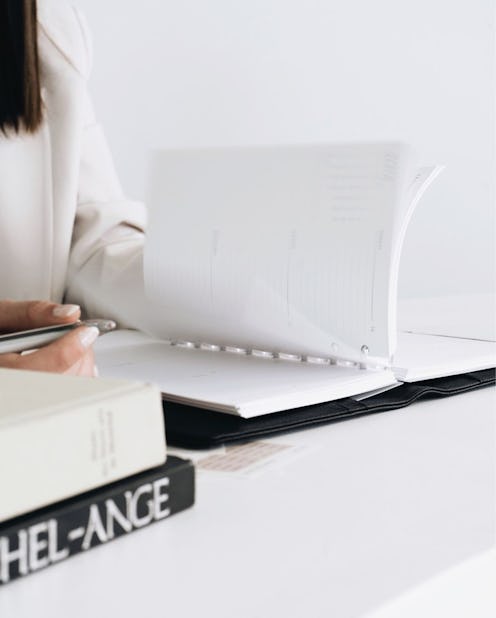(Mindfulness)
Keeping A Paper Planner Has Done Wonders For My Mental Health — Here's Why
There’s a science behind it.

Although I live by Google calendar, mainly to keep track of appointments and deadlines, I can’t function without my paper planner. Here’s why: Not only does a paper planner help me stay on top of work and personal tasks, but it also provides many mental health benefits. For starters, it helps me organize and plan my day in a less stressful way (i.e., I don’t add in more than I can realistically do). When I’ve tried digital planning in the past, I found that it was way too easy to cram too many tasks into my schedule, which made me feel overwhelmed. Putting my daily to-dos down on paper, however, provides me an opportunity to be more intentional about what tasks I will focus on for the day.
“For some people, writing makes them feel more engaged with the subject matter which, if this is the case, may be more helpful to their mental health because they are more able to think about and process the material they feel more engaged with and will learn or remember,” says Gail Saltz, MD, the clinical associate professor of psychiatry at the New York Presbyterian Hospital, Weill-Cornell Medical College.
Plus, I’m also a very visual person. So the less I see on my list or schedule for the day, the more at ease I feel and the more motivated I am to check things off. “It’s visually manageable and [people] are less likely to feel chaos,” Dr. Saltz says about using paper planners. People who use paper planners, she adds, are “also likely to not worry about forgetting due dates and appointments.” Again, this is because the schedule you write down for the day only focuses on the essential tasks and appointments for that day versus everything else on your plate, which means you’re less likely to let the important things fall through the cracks.
Beyond writing to-do lists, paper planners are also helpful tools for setting goals and intentions, tracking moods and health symptoms, and logging wellness habits. I’ve also found it very helpful to use my planner for journaling to work through whatever is coming up for me that day. “Journaling is a useful way to record feeling states, which is a form of self-observation known to be helpful in reducing anxiety,” Dr. Saltz says. “It may also help you explore your own thoughts, and self-reflection is useful in self-analysis. More knowledge about your own thoughts gives you more choice over your own behaviors.”
All that said, Dr. Saltz adds that paper planning may not be for everyone. Some may reap the same mental health benefits from using a digital planner, in which case, rock on. But if you’re like me and find pleasure, ease, and enjoyment in writing things down on paper, Dr. Saltz says consistency is key for reaping the mental health benefits of using a paper planner. “Make recording and logging a habit,” she says. “Same for journaling. Set aside 10 minutes early in the day and late in the day to do it.”
The best part? Many planners and planner accessories available make using a paper planner for self-care and mental health easy and, dare I say, fun. Keep scrolling for some picks worth shopping.
We may receive a portion of sales if you purchase a product through a link in this article.